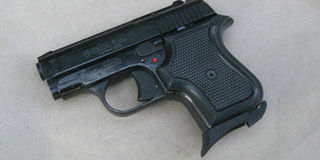Strict gun control regulations in best interest of Kenya and region

Although many criminals use illegally acquired firearms, they also operate with legally owned weapons, either hired or stolen. PHOTO | FILE | NATION MEDIA GROUP
What you need to know:
- Licensed gun holders are not trained in law enforcement; handling life-threatening situations is, therefore, not in their purview.
- The new Kenya Coast Guard Service is a way of responding to terrorism and other transnational organised crimes fuelled by firearms trafficking.
Security is the most critical prop in any economy. At the national level, this element is the nerve centre of all sectors of the economy and a compromise on any safety or security layer can have far-reaching ramifications.
One of the biggest security challenges many governments grapple with is proliferation of firearms among civilians.
This has been a direct cause of the increase in armed crime and inspired dangerous gangs and militias.
In Kenya, corruption, political influence and various lapses in the regulation have seen an alarming increase in illegal purchase of guns. This has fuelled organised crime — such as carjackings, drug trafficking, robbery with violence and poaching.
There are varied reasons for the acquisition of firearms. In some cases, they are owned as part of a tradition or with the intention of perpetrating criminal activities for political or financial gain.
For instance, criminal gangs have gained infamy for committing heinous crimes in urban centres and informal settlements in Nairobi, Coast, Nyanza and Western.
Although many criminals use illegally acquired firearms, they also operate with legally owned weapons, either hired or stolen.
RESOURCES
In some predominantly pastoralist counties, community tensions are increasingly creating a demand for small arms as groups compete for scarce resources and protect their livelihoods. In such cases, the motivation for firearms possession is mainly defensive.
However, in the recent past, the concentration of illegal guns — especially in the North Rift, Upper Eastern and the South Rift — has been driven by negative ethnicity and political incitement for the residents to defend themselves against perceived dangers.
This has not only aggravated the retrogressive cultural practice of cattle rustling, but also ethnic animosity, to the detriment of investment and economic activities in those areas.
The government has taken drastic measures to clean-up an accretion of irregularities in the licensure of firearms. First, there has been a progressive deployment of more personnel to improve policing and security in most restive areas.
REFORMS
Protection of lives and property of citizens is the cardinal responsibility of the government. Armed civilians do not have the capacity to stop a crime.
Licensed gun holders are not trained in law enforcement; handling life-threatening situations is, therefore, not in their purview.
Secondly, the appointment of a new team to the Firearms Licensing Board (FLB) is one of the precursory steps towards improved firearms control.
The board is working on modalities for a digital register of civilian firearms, to be complemented with thorough background checks to authenticate the existing licences.
There have been cases where civilians have had access to military-grade firearms and accessories. For instance, during the election period, detectives found an M4 in a private residence — a clear indication of loopholes in the firearms control.
Thirdly, the recent restructuring of the National Police Service will help to curb the smuggling of firearms.
SMUGGLING
The Administration Police, now responsible for border control, will address the issue of porous borders, which is one of the many shared regional concerns.
They will ensure that no weapons are trafficked into our country by sneaky dealers and other criminals.
The new Kenya Coast Guard Service is a way of responding to terrorism and other transnational organised crimes fuelled by firearms trafficking.
Statistics show that countries with permissive gun control laws have higher gun-related crimes. For instance, according to a March 2016 study, gun crime rates in the United States were 25.3 times higher than in other populous, high-income countries.
We need stricter enforcement of the Firearms Act and other related gun laws and to streamline the acquisition and licensing of firearms for private use to complement the work of the Kenya National Focal Point (KNFP) on Small Arms and Light Weapons.
This is in the best interest of our country and the region.
Dr Matiang'i is the Ministry Interior and Coordination Cabinet Secretary.





